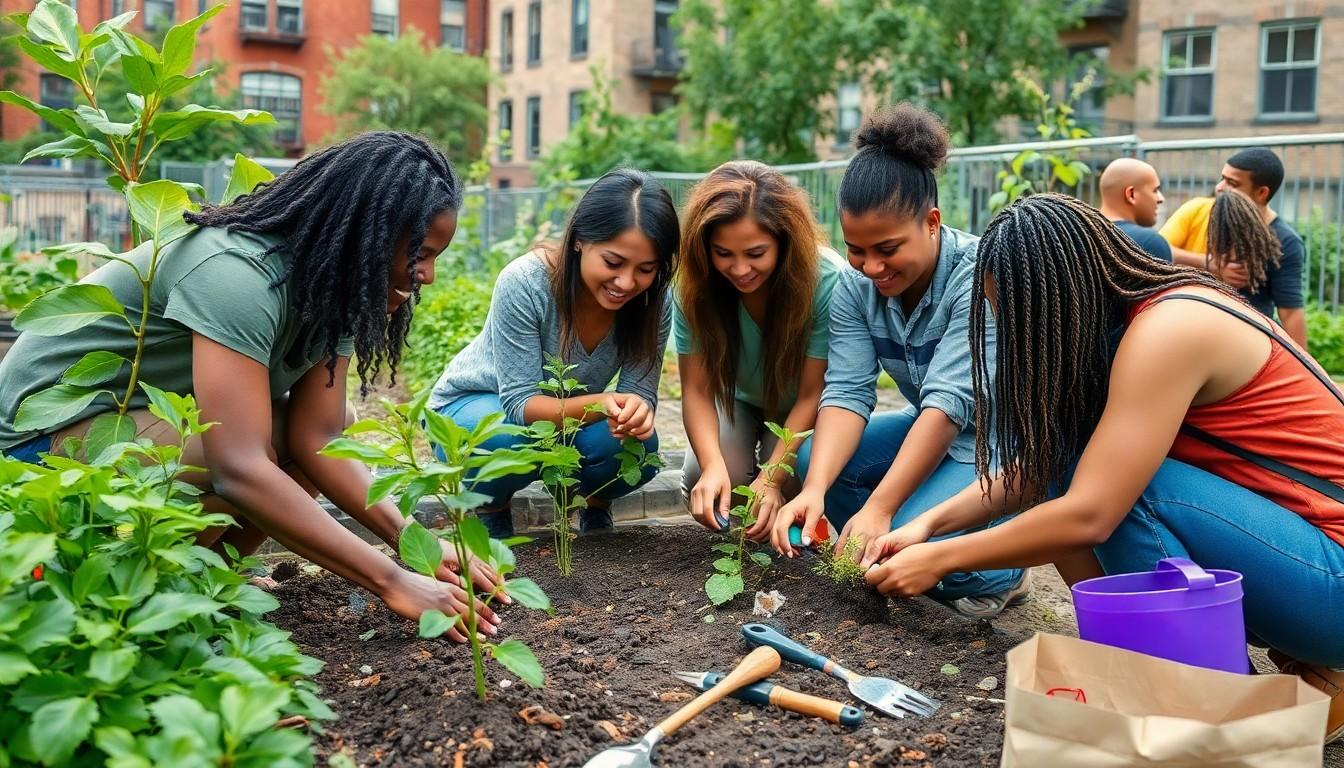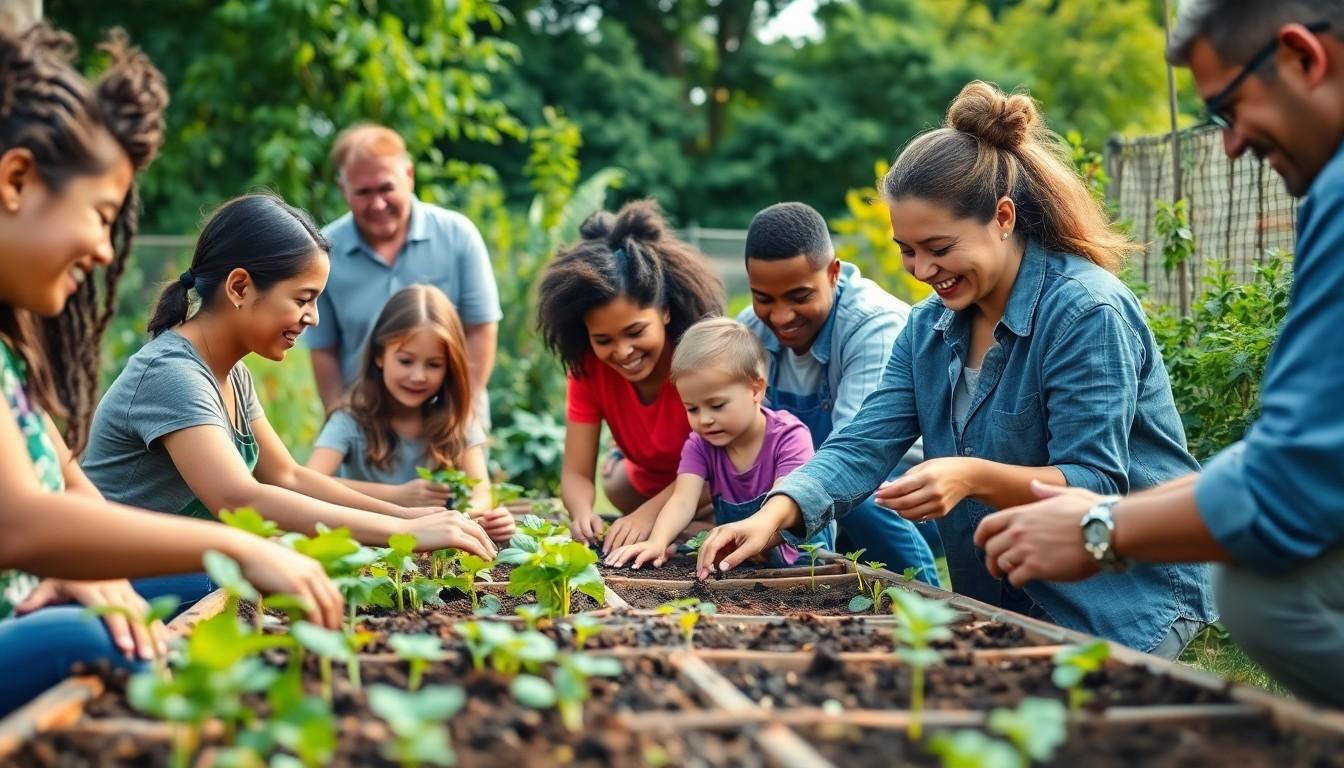In a world where the coffee cup is mightier than the sword, sustainable living education is the secret weapon for a greener future. Imagine a life where every choice you make not only saves the planet but also makes your friends think you’re a superhero. It’s not just about recycling last week’s pizza box; it’s about transforming everyday habits into eco-friendly practices that even Mother Nature would give a thumbs up.
Sustainable Living Education
Sustainable living education provides individuals with knowledge and skills necessary for eco-conscious choices. This type of education addresses critical topics such as resource conservation, waste reduction, and biodiversity preservation. Educators emphasize the connection between daily actions and their impact on the environment, helping learners understand how small changes can lead to significant positive outcomes.
Integrating sustainable practices into everyday life involves understanding topics like energy efficiency and sustainable agriculture. Programs often include hands-on activities that encourage participants to implement eco-friendly habits at home and in their communities. Examples may range from urban gardening to water conservation techniques, reinforcing practical skills that promote sustainability.
Community-based initiatives also play a crucial role in sustainable living education. These initiatives foster collaboration among individuals, local organizations, and governments to create supportive environments. Participants learn from one another, sharing successful strategies and resources that contribute to a collective effort toward a more sustainable future.
Online platforms and workshops expand access to sustainable living education. Resources like webinars, interactive courses, and digital content enable widespread participation. Individuals can gain valuable insights at their convenience, allowing for a more inclusive approach to learning about sustainable practices.
Research shows that enhanced education in sustainability leads to more conscious consumer behaviors. As more people engage with these educational programs, the overall awareness of environmental issues increases. Collective efforts catalyze community-driven projects, illustrating the power of informed individuals in promoting sustainable living.
Importance of Sustainable Living Education

Sustainable living education serves as a vital mechanism for fostering eco-conscious behaviors. It directly influences individual lifestyle choices aimed at protecting the environment.
Environmental Impact
Sustainable living education promotes understanding of resource conservation techniques, which significantly reduce energy consumption. Environmental awareness leads to actions such as minimizing waste, resulting in lower landfill contributions. Educational programs illustrate how small decisions, like reducing plastic use, can contribute to broader ecological health. Knowledge of biodiversity preservation encourages individuals to support local ecosystems, creating a more resilient environment. When communities embrace these practices, collective efforts yield substantial decreases in carbon footprints. Ultimately, informed behavior shifts lead to a healthier planet.
Social Implications
Effective sustainable living education cultivates a culture of collaboration within communities. Participants frequently discover shared values, fostering connections among individuals and organizations dedicated to environmental goals. It enhances social equity by providing equal access to sustainability resources, encouraging diverse community engagement. Educational initiatives inspire residents to work together on local sustainability projects, reinforcing social ties and community spirit. Building awareness of sustainability issues cultivates responsible citizenry, creating advocates for change within society. Such movements can empower individuals to drive initiatives that address social and environmental justice.
Key Concepts in Sustainable Living Education
Sustainable living education covers essential concepts that empower individuals to make environmentally sound choices.
Renewable Resources
Understanding renewable resources plays a critical role in reducing dependence on non-renewable energy. Solar, wind, and geothermal sources provide cleaner alternatives to fossil fuels. Communities benefit from this shift, as harnessing renewable energy leads to decreased greenhouse gas emissions. Educators emphasize local energy solutions, inspiring individuals to explore solar panel installation and wind turbine usage. By incorporating renewable technologies in homes, people experience reduced energy costs while contributing to a healthier planet.
Waste Management
Effective waste management strategies are fundamental in promoting sustainable living. Composting organic material significantly reduces landfill contributions while enriching soil health. Recycling programs encourage individuals to sort materials accurately, ensuring proper processing and minimizing waste. Communities that adopt zero waste initiatives create vibrant ecosystems where resources circulate efficiently. Enhanced education in waste practices fosters a culture of responsibility, urging individuals to rethink consumption and disposal habits. Engaging workshops highlight innovative ways to repurpose items, showcasing the value of creative solutions in waste reduction.
Approaches to Teaching Sustainable Living
Sustainable living education employs various strategies to effectively engage individuals in eco-friendly practices. Two primary methods include formal education programs and community workshops.
Formal Education Programs
Formal education programs integrate sustainability into curricula from elementary schools to universities. These programs emphasize hands-on learning experiences, allowing students to interact with their environment. Engaging activities, such as garden projects or energy audits, enhance understanding of sustainability concepts. Teachers incorporate critical thinking skills, encouraging students to analyze their consumption patterns and resource use. Institutions often partner with local businesses and organizations, providing real-world contexts for learning and promoting cooperative efforts towards sustainability goals.
Community Workshops
Community workshops serve as an accessible platform for teaching sustainable living practices. Local organizations often host events that cover topics like composting, permaculture, or energy conservation. Participants engage in interactive sessions, fostering a sense of community through shared experiences. Workshops facilitate knowledge exchange among attendees, empowering individuals to implement sustainable practices at home. These gatherings also promote networking among residents, providing ongoing support for sustainability initiatives. Hands-on demonstrations allow community members to witness the benefits of eco-friendly habits firsthand, reinforcing the importance of collective action for a healthier planet.
Challenges in Sustainable Living Education
Sustainable living education faces several challenges that hinder its effectiveness and reach.
Accessibility Issues
Access to sustainable living education often presents significant barriers. Geographic location impacts resources available to individuals, leading to disparities in education quality. Communities in urban areas may benefit from more programs, while rural settings often lack essential learning opportunities. Economic factors play a crucial role as well, with those in lower-income brackets struggling to afford participation in workshops or courses. Language barriers can complicate understanding lessons and affect engagement among diverse populations. Addressing these accessibility issues requires targeted initiatives to ensure equitable access to sustainable education.
Curriculum Development
Developing a comprehensive curriculum in sustainable living poses unique challenges. Integrating sustainability into existing educational frameworks must align with academic standards while remaining engaging. Experts emphasize the need for hands-on, experiential learning to make concepts relatable and memorable. Striking a balance between theoretical knowledge and practical application is vital to foster lasting understanding. Additionally, continuously updating content to include emerging trends and technologies enhances relevance. Collaboration among educators, environmental scientists, and community leaders ensures a well-rounded curriculum that meets diverse learner needs, preparing students for real-world sustainability challenges.
Culture of Responsibility and Collaboration
Sustainable living education plays a vital role in shaping a more environmentally conscious society. By empowering individuals with the knowledge and skills to make eco-friendly choices, it fosters a culture of responsibility and collaboration. As communities engage in sustainable practices together, they not only reduce their carbon footprints but also strengthen social ties. The journey towards a greener future begins with informed choices and collective action. Embracing sustainable living is not just a personal commitment; it’s a shared mission that can lead to lasting positive change for the planet and future generations.

